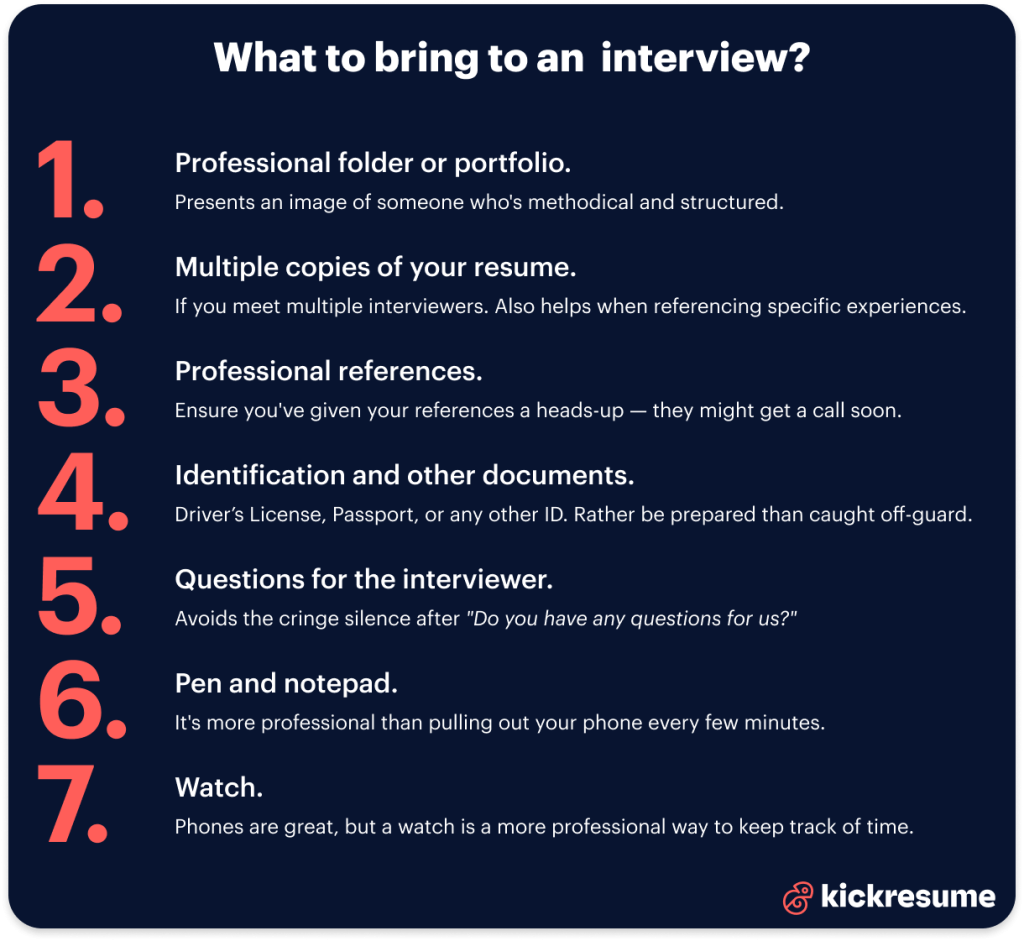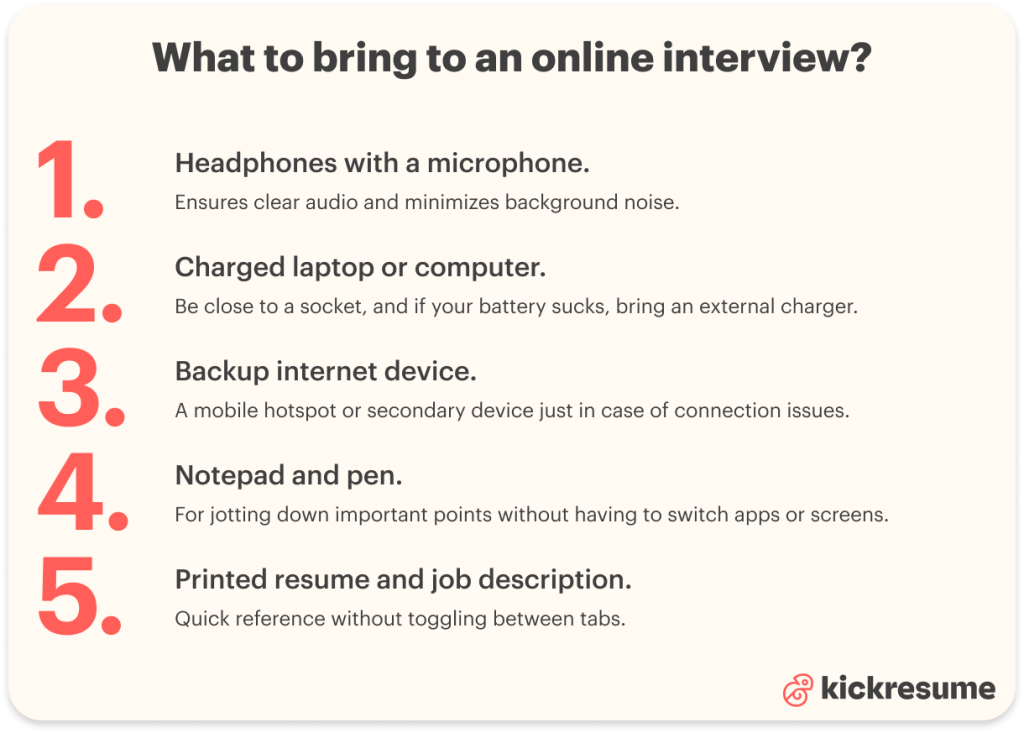Navigating the job market can feel like a maze, and when you finally secure that interview, you might ask yourself, "What to bring to an interview?"
Whether you're a fresh graduate, a teenager stepping into the professional world, or someone eyeing a shift in career, preparation is key.
While nailing your responses and being mentally prepped is crucial, the items you bring along can also make a significant impact.
Wondering what to bring to an interview as a teenager? Or perhaps not sure about the documents you should bring to an internship interview?
Being clear about what to bring can be the difference between appearing organized and professional versus seeming unprepared.
So, let's delve into the specifics and help you walk into that interview room with confidence.
Must-haves checklist
Every interview, regardless of the job or industry, requires certain staples. These are your non-negotiables, which show you’re both organized and serious about the role.
Here's a checklist of 7 must-have items to bring to an interview:
- Professional folder or portfolio. A consolidated space to keep all your materials. Presents an image of someone methodical and structured.
- Multiple copies of your resume. You might meet multiple interviewers. Handing each a copy not only saves them time but highlights your preparedness. It also helps when referencing specific experiences.
- Professional references. This isn't just a list of names; it's a testament to your professional journey. Ensure you've given your references a heads-up — they might get a call soon.
- Identification and other documents. Often overlooked, but some companies need these for verification. Whether it's a Driver’s License, Passport, or any other ID, it’s better to be over-prepared than caught off-guard.
- Questions for the interviewer. Crafting a few thoughtful questions saves you from that cringe-worthy silence that usually follows the "Do you have any questions for us?" moment. It shows you've done your homework and genuinely care about the role and company.
- Pen and notepad. It's more professional than pulling out your phone every few minutes. Plus, it's perfect for quickly scribbling down key names, dates, or those "aha!" insights that pop up during the conversation.
- A watch. Time management speaks volumes. While phones are great, a watch is a more subtle and professional way to keep track of time.
Each of these items not only serves a functional purpose but also crafts a narrative about who you are and how you operate. So the next time you're preparing for an interview, revisit this checklist.
What to bring to an interview as a teenager?
First off, let's address the elephant in the room. As a teenager, diving into the professional world can be overwhelming.
Whether it's a summer gig, an exciting internship, or a volunteer opportunity, there’s a first for everything.
And hey, feeling a bit lost or unsure? Totally normal! We've all been there.
But being equipped with the right items can be a small yet powerful step in easing those nerves.
Now, onto the golden checklist of what to bring to an interview as a teenager:
- Educational achievements or certificates. Just aced that algebra test or completed a coding course? They shout out your dedication and skills.
- Extracurricular activity evidence. Whether you're the captain of the debate team, part of the school play, or into sports, these activities reflect your teamwork and leadership skills. Photos, certificates, or even newspaper clippings – they all count.
- Part-time job or volunteering experience. Even if it was just helping at your local library or a stint at the ice cream parlor, it gives a sneak-peek into your work ethic and responsibility levels.
- Questions about the role. Since it may be your first-ever interview, you probably still don't know much about how jobs work. Hence, it's best to ask beforehand. Here’s a list to start with:
- How often do we get paid? Weekly, monthly?
- Who's the person to go to if I have questions?
- What are your expectations from me in the first few days?
- I'm not 18 yet – do you need my parents to sign any paperwork?
- Your first resume. Even if it’s brief, it matters. No stress if you're unsure how to start or what to include! Online resume builders can help you whip up a pro-looking one in no time.
With this checklist in hand and a sprinkle of self-belief, you're all set to ace that interview. Go on and show them what you've got!

What to bring to an internship interview?
Internships are not the same as regular jobs. They're your sneak peek into the "real world" but without the full commitment of a 9-to-5.
And since internships often lean more towards learning and less about what you've done, what you bring should reflect that.
Here's what to bring to an internship interview:
- Course Syllabus. It's a quick way to show how your education aligns with the internship and fills in the "experience" gaps.
- Academic projects. Got a group project you're proud of? It’s proof you can work in a team and take initiative.
- A list of skills you want to learn.This isn't just about what you can offer them, but what they can offer you. Show them you're eager to grow.
- Tech or tools you've played with. Maybe you've dabbled in a new software for fun, or you've played around with some cool apps related to your field.
And if you're left wondering how to kickstart the process in the first place, you can apply for an internship via email using these email templates.
What documents should you bring to an interview?
When it's game day and you're suiting up for that interview, it's not just about bringing your A-game mentally. You've got some physical homework to take along too.
Here's a list of documents you should bring to an interview:
- Resume. It's the document they’ve likely seen, but having a crisp copy (or two) on hand is non-negotiable. It’s your professional journey on paper. Plus, you can refer back to it when asked about your previous experience.
- Cover letter. Even if they’ve seen it digitally, a hard copy can serve as a quick refresher for the interviewer. It gives context to your resume.
- ID card/passport. Most companies require a formal ID for security and verification. It's always good to be prepared.
- Driver's license. If the role involves driving or you're applying out of state, this can be a crucial piece of ID.
- Social security card. Many employers ask to see your social security card for payroll and tax reporting purposes. It’s handy, just in case.
- List of professional references. These are the people who can vouch for your skills and character. Ensure they know they might receive a call!
Gathering up these documents shouldn't be a problem. Chances are, they're either already in your wallet or you've prepped them for the interview.
What NOT to bring to a job interview
Going into an interview, we usually focus on what to bring. But let's flip the script for a sec.
Here are a few things you'd best leave at home for a job interview:
- Overbearing perfume. A little goes a long way. Remember, some people might be allergic or sensitive.
- Chewing gum. It might keep your breath fresh, but chomping away during a conversation isn't a good look.
- Your entire life in a bag. Bringing a massive bag or backpack can seem messy. Especially when you need to fetch something quickly and can't find it.
- Loud jewelry or accessories. While personal style is important, avoid accessories that make noise or can be distracting.
- Smartphone (on loud). An unexpected ring or notification can interrupt your flow and distract both you and the interviewer.
- Food or drinks. Carrying a coffee or snack might seem harmless, but it's best to consume these before entering. Spills or crumbs can make things awkward!
- Too much personal info. Your interview should revolve around your professional attributes. Avoid bringing up personal issues or sharing TMI unless it’s directly relevant.
Remember, interviews are a blend of showcasing your skills and demonstrating good judgment. Every choice, including what you decide not to bring, plays a role in building that critical first impression.
General job interview tips
Acing an interview goes beyond just checking off a list. It's the vibe you bring, the homework you've done, and the smart way you connect.
Let's dive into some general interview tips to help you leave a lasting mark:
- Research the company. Understand the company's history, values, and current news. It demonstrates interest and initiative.
- Rehearse common questions. While you can't predict every question, practicing answers to common ones like "Why should we hire you?" will boost your confidence.
- Dress the part. If you're not sure what to wear to a job interview, it's always better to be slightly overdressed than under. Ensure your attire fits the company culture.
- Body language matters. A firm handshake, maintaining eye contact, and sitting up straight convey confidence.
- Listen Actively. Don't just wait for your turn to talk. Engage with the interviewer and show genuine interest in what they say.
- Ask questions. When the interviewer asks if you have questions, it’s your time to shine. Prepare some thoughtful queries to highlight your enthusiasm.
- Follow up post interview. A thank-you email after an interview or note can set you apart. It reiterates your interest and shows gratitude for the opportunity.
How to prepare for an online interview?
The world is ever-evolving, and the interview process hasn't been left behind.
With a rise in remote jobs and global teams, virtual interviews have become commonplace.
But, how do you navigate this digital domain?
- Tech check. Make sure your internet connection is stable. Test your camera and microphone. Use headphones to reduce background noise and offer clearer audio.
- Have a backup plan. Technology can be unpredictable. Have a phone on standby in case of any technical issues.
- Choose your background wisely. Opt for a clean, clutter-free background. If you're using virtual backgrounds, make sure they look professional and aren't distracting.
- Maintain eye contact. Look at the camera, not the screen. This gives the impression of making eye contact with the interviewer.
- Prepare your environment. Minimize potential disturbances. Inform household members of your interview to avoid unexpected interruptions.
And if you thought you don't have to bring any items with you to an online interview, you're mistaken.

Key takeaways: What to bring to an interview?
Your mind is the star of the show. Preparing it is your top priority. But ever felt that mini heart attack when you can't find an essential item minutes before leaving?
We've all been there. That's why we believe in the power of preparation – not just mentally, but physically too.
And that's exactly why we prepared the ultimate 7-item checklist for what should you bring to an interview:
- Professional folder or portfolio.
- Multiple copies of your resume.
- Professional references.
- Identification and other documents.
- Questions for the interviewer.
- Pen and notepad.
- Watch.
With this in hand, you're not just walking into an interview. You're making an entrance. So, keep this guide handy the next time that interview call comes in.



